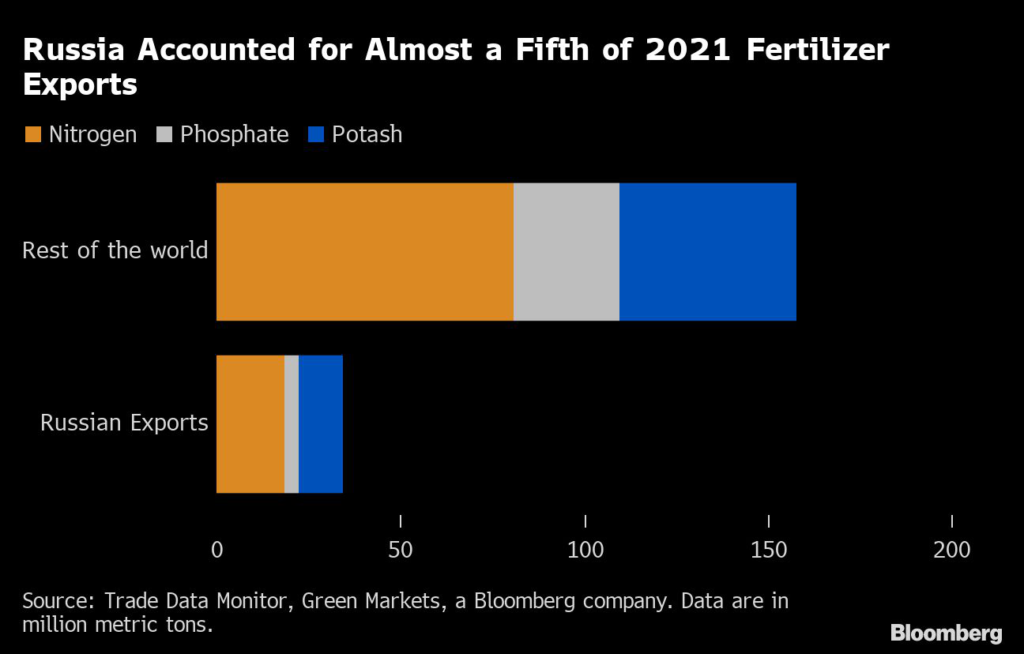Russian fertilizer billionaire Andrey Melnichenko is lobbying politicians in Africa to pressure the European Union into finding a solution to what he says are sanctions-related disruptions choking flows of food and vital crop nutrients.
(Bloomberg) — Russian fertilizer billionaire Andrey Melnichenko is lobbying politicians in Africa to pressure the European Union into finding a solution to what he says are sanctions-related disruptions choking flows of food and vital crop nutrients.
While EU sanctions on Russia don’t target agricultural products or fertilizers, trade is still being affected, he said. That’s curbed fertilizer shipments by about 9 million tons so far this year, said Melnichenko, the founder of EuroChem Group AG.
EU member states have been applying different sanctions policies among themselves to Russian fertilizer producers, Melnichenko, who is sanctioned himself, said on Wednesday.
Earlier this month, the 27-nation bloc introduced derogations — unfreezing the assets of certain individuals within the agri and fertilizer industries — in light of what it said were persisting “food security concerns” in third countries. The ninth package of EU sanctions is part of efforts in Brussels to punish Vladimir Putin’s regime for the invasion of Ukraine, while softening any unintended consequences for world trade.
In an interview last week, Melnichenko said the EU initiative is an acknowledgment that its actions are worsening a global food crunch. The derogations won’t improve the situation as they complicate the procedures, he added.
While Russia remains one of the world’s biggest fertilizer exporters, it produced less this year after the invasion triggered sanctions. That hit 8 million tons of Russian shipments and another 1 million tons from EuroChem plants in Europe, according to Melnichenko. Shortages of those nutrients boost farming costs and lower crop yields, ultimately hitting consumers as food prices soar.
Melnichenko flew to South Africa to lobby politicians on the sidelines of the ruling African National Congress’s electoral conference. He wants the continent’s most industrialized nation to back his pleas for the EU to resolve the issue, saying projected fertilizer shipments lost to sanctions over 12 months would grow enough grain to feed more than 200 million people.
“I don’t think that people who are suffering from basically lack of food need to take a side in the conflict,” Melnichenko said in the interview in Irene, north of Johannesburg.
He declined to name the politicians he met.
The US and France are trying to counter Russian influence in Africa, including efforts by the Kremlin to link this year’s food crisis to European sanctions. Crop prices soared after Russia blockaded Ukraine’s Black Sea grain ports — increasing the risk of famine and hunger across parts of Africa — before an export corridor was opened under a deal brokered by Turkey and the United Nations.
The fertilizer shortage means African farmers will pay an additional $2 billion for the crop nutrient this year, said Melnichenko, who is part of an industry group raising awareness about the consequences of the EU’s sanctions for global food security.
The security of 50% of the world’s population — who depend on food produced with the help of mineral fertilizers — is at risk, according to the UN’s World Food Programme.
While Melnichenko said the latest changes to EU sanctions will complicate the situation, the government in Ukraine has also pushed back.
Worth an estimated $13 billion according to the Bloomberg Billionaires Index, Melnichenko earlier this year withdrew as a beneficiary of a trust that holds his EuroChem stake through a holding company. That left his wife, who was later sanctioned, as the beneficiary. The tycoon, who resides in United Arab Emirates after living for many years in Europe, hasn’t held executive positions at Eurochem and his coal company, Suek JSC, for years.
Melnichenko is mounting a legal challenge to the EU sanctions imposed on him in March, saying the impact of those measures are disproportional.
“There are millions of people who are suffering because of the sanctions imposed personally on me,” Melnichenko said. “I have done nothing wrong. I don’t have anything to do with this conflict. Nobody asked my advice.”
The tycoon said he hopes the “horror” of the war between Russia and Ukraine will be stopped, but added that there is no indication of a solution anytime soon.
–With assistance from Richard Bravo.
(Adds Melnichenko comment in third paragraph. An earlier version of this story was corrected to remove references to self-sanctioning and show that the fertilizer costs in the 11th paragraph refer to Africa.)
More stories like this are available on bloomberg.com
©2022 Bloomberg L.P.










